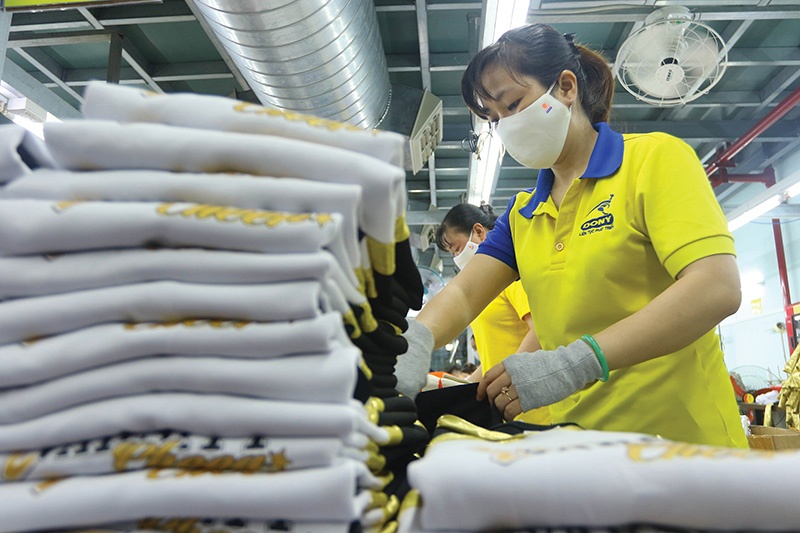New overtime plans facing scrutiny
 |
| Many employees are more willing to work extra hours due to the increase in financial strife over the past couple of years, photo Le Toan |
The ministry’s plan is to adjust the overtime work to 72 hours instead of the current 40 hours per month while simultaneously applying an overtime framework to 300 hours per year for all sectors, compared to the existing 200 hours.
If the Ministry of Labour, Invalids, and Social Affairs’ (MoLISA) proposal is approved by the committee, it could be good news for manufacturers that have clamoured for years for a loosening of the overtime cap. The proposal has received different opinions from business associations and employers.
According to a number of employers, the limitation on overtime hours causes difficulties for foreign companies, especially in manufacturing, and may greatly impact foreign investors’ decisions to fund ventures in Vietnam. They expect to adjust the overtime cap of local labourers to 300 hours for normal industries and 400 for some special situations.
Business associations also added that many labourers would be willing to work extra hours to earn more because their finances have been exhausted as an aftermath of economic troubles in recent years.
However, trade unions have opposed the removal of the overtime cap and increase of the overtime limit for the whole year.
A representative of the trade union of VSIP 1 Industrial Zone in the southern province of Binh Duong told VIR, “The overtime cap is a controversial problem. A part of employees said that they are willing to work extra hours, however, they have no choice because of the pressure of earning money to keep the wolf from the door.”
A member of the trade union of the foreign-owned sportswear maker Far Eastern Apparel Vietnam Ltd. said that a very large portion of the company’s over 4,000 employees have agreed to work overtime to have a bit more money, but would refuse if their existing income was higher.
“In my opinion, it is not necessary to issue the proposal because, during peak seasons, many manufacturers make their employees work overtime or even exceed the extra hours as regulated in the law,” the representative said.
The Vietnam Association of Seafood Exporters and Producers (VASEP) was one of the first to respond to the MoLISA’s proposal, highlighting its main issues.
“The COVID-19 pandemic had a strong impact on Vietnam’s seafood production in the south which accounts for 90-95 per cent of the country’s export turnover and the industry’s labour force,” noted VASEP in a document sent to the MoLISA.
During the past two years, 70 per cent of its members’ facilities had to suspend operations while the remainder applied the stay-at-work model. As a result, in August only, seafood exports to all markets decreased by 16-50 per cent compared to the same period in 2020.
Exports to China and Japan both decreased sharply by 36 per cent on-year, and to the EU by 32 per cent. Exports to the United States and Russia went down by at least 16 per cent, while those to the United Kingdom, Australia, and Canada by 48, 35, and 37 per cent, respectively.
The Vietnam Textile and Apparel Association (VITAS) also mentioned the same difficulties. The association showed that the removal of the overtime limit is necessary to help manufacturers deal with the overload of orders.
Enterprises would need to accelerate production to ensure delivery of goods on time and regain customers’ trust. VITAS suggested that enterprises could calculate the overtime work to not exceed the regulation of 300 hours per year.
The Labour Code 2019 limits overtime to 40 hours a month and 200 hours a year in most industries, while 300 hours a year are applied in a few sectors such as garments and textiles, footwear, agricultural processing, electricity generation, telecommunications, oil refining, water supply and drainage, and electronics.
What the stars mean:
★ Poor ★ ★ Promising ★★★ Good ★★★★ Very good ★★★★★ Exceptional
Related Contents
Latest News
More News
- State corporations poised to drive 2026 growth (February 03, 2026 | 13:58)
- Why high-tech talent will define Vietnam’s growth (February 02, 2026 | 10:47)
- FMCG resilience amid varying storms (February 02, 2026 | 10:00)
- Customs reforms strengthen business confidence, support trade growth (February 01, 2026 | 08:20)
- Vietnam and US to launch sixth trade negotiation round (January 30, 2026 | 15:19)
- Digital publishing emerges as key growth driver in Vietnam (January 30, 2026 | 10:59)
- EVN signs key contract for Tri An hydropower expansion (January 30, 2026 | 10:57)
- Vietnam to lead trade growth in ASEAN (January 29, 2026 | 15:08)
- Carlsberg Vietnam delivers Lunar New Year support in central region (January 28, 2026 | 17:19)
- TikTok penalised $35,000 in Vietnam for consumer protection violations (January 28, 2026 | 17:15)

 Tag:
Tag:




















 Mobile Version
Mobile Version